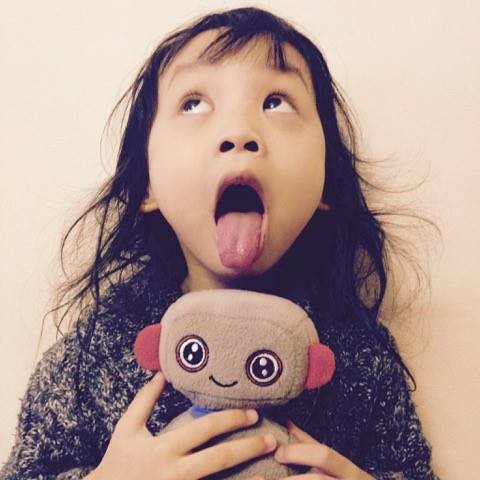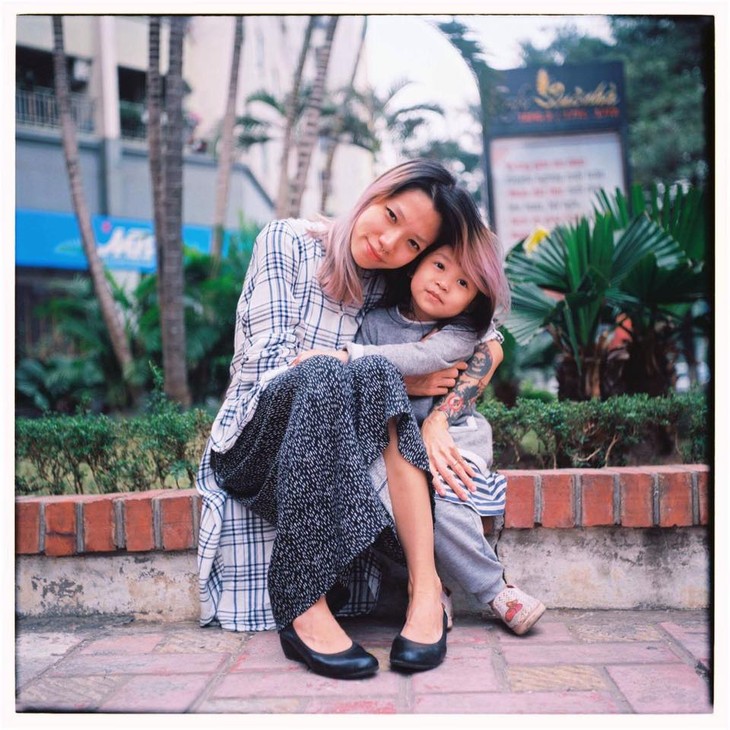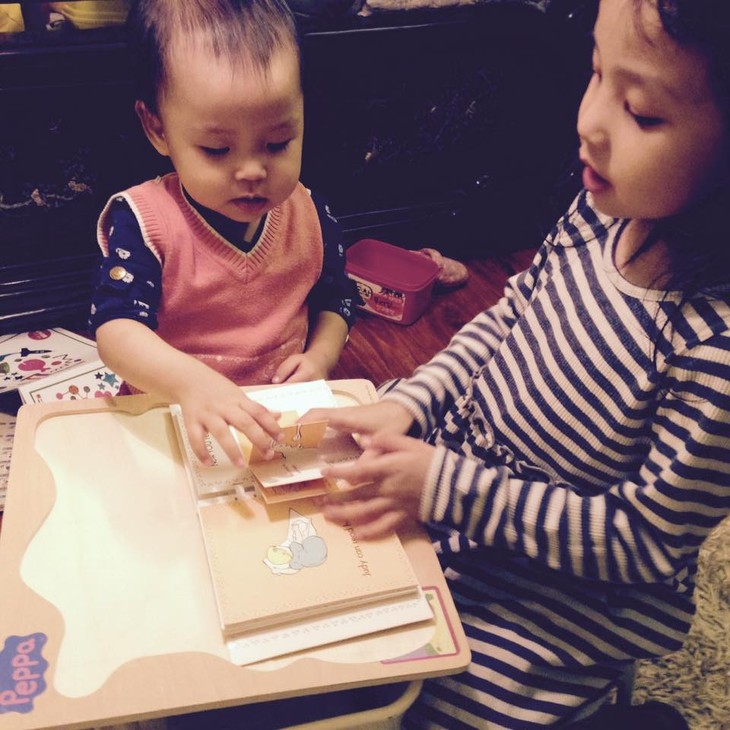(VOVworld) - Homeschooling, already popular in many Western countries, is becoming accepted in Vietnam. Let’s follow VOV reporter Thanh Ha to visit 4-and-a-half-year-old Tue Lam and her mother Phuong Dang to find out about their homeschooling experience.
There’s a common saying in Vietnamese: “A day at school is a day full of fun”. For 4-and-a-half-year-old Tue Lam, often called Bu, every day is full of adventures and joy, but not at a school. She has been homeschooled by her mother, 29-year-old Phuong Dang, for more than 2 years. Their typical day includes a lot of free play and free discussion in English on diverse topics such as math, animals, or science. Today’s topic is plants and trees:
- Bu: “This is a seed, and it grows bigger and bigger into a sunflower.”
- Mom: “Alright, plants and trees. What is this?”
- Bu: “It’s a seed.”
- Mom: “And it grows into a…?”
- Bu: “A seedling”.
- Mom: “This part right here?”
- Bu: “The roots”.
- Mom: “Correct!”
 |
| Lovely little Bu (Source: Phuong Dang) |
Phuong graduated from SUNY Plattsburg University in New York, Fine Arts Major and has 5 years of experience teaching English to both children and adults. After researching homeschooling and observing the way children develop, Phuong believes this is the best education for her child: “I chose homeschooling because I believe that free play is very important for children. Children learn a lot through freely exploring things or the environment at their own pace. And it’s also important that children have enough space for moving and using their body however they want. I read a lot of books by different authors who write about education. You gotta educate yourself first when you want to educate your kid.”
For the past 2 years, Phuong has been teaching her daughter English through ordinary conversations and a lot of reading. Now, at the age of 4 and a half, little Bu can communicate fluently in English about the weather, the environment, machines, bikes, even abstract things like life, death, and love. She seems to enjoy absorbing knowledge effortlessly through talking and reading: “Six and then seven… I can count higher than seven. I learn all of this from mommy’s English. I speak English all day long. I have a book about math, and a book about how things work, too, about machines.”
 |
| Bu and her mother (Source: Phuong Dang) |
Phuong believes each child develops at her own pace, so she doesn’t pay too much attention to how many milestones her daughter has reached. The most important thing is that she gets to watch her child grow every day, as opposed to receiving assessments from teachers at the end of the school day and assuming that they’re accurate. At first, Phuong’s family were not completely convinced to let little Bu follow this path. The most troubling issue to them is how she will develop social skills if she doesn’t go to school. Phuong has the answer: “Most people believe that homeschooled kids only spend all their time at home, and that’s not quite true. We do go out together. I take my kid to very normal places like supermarkets or coffee shops or other public places like the parks, or playgrounds where she can meet other kids. Most of the time she doesn’t know them but it doesn’t take kids a long time to play together. The other part about homeschooling is the kids also spend a lot of time with their family members, their parents, their siblings and their grandparents so they have an opportunity to develop their relationship with the family. Socializing can happen between individuals of various ages.”
In fact, Little Bu seems to be a very outgoing person with no trouble making friends with the people she meets:
- Bu: Thirteen is like this, 1… 3!
- Reporter: Wow, I guess you’re very good at math!
- Bu: Yes! 1 and 1 equals 2! That is math. I can do a lot of math!
- Reporter: Wow, what about 2 and 3?
- Bu: Well, 2 and 3… I don’t know. Just, 1 and 2 become 3.
- Reporter: Good! And then 2 and 2?
- Bu: 2 and 2 become 4!
- Reporter: Yay! You got it! Very good! Can you tell me about animals?
- Bu: Well I will tell you later when it’s night time. But it’s not night time!
- Reporter: We can pretend that it’s night time because we have the lights on! The lights are always on when the night comes, right?
- Bu: Yes! Well… Animals live in the forests but there’s no forest anymore. People chopped down trees. I have a new tree over there.
- Reporter: Did you chop it down from the forest?
- Bu: No… Grandmom bought it!
Her Grandmom, Mrs. Diep Hoa, couldn’t hide her happiness seeing her granddaughter grow up well: “When I first heard about Phuong’s decision to homeschool her kids, I was very worried because at that time I didn’t know what homeschooling was like. Then she explained to me in detail and showed me scientific evidence to answer my questions, including how the kids would develop communication skills if they are homeschooled. The fact is that her first daughter, Bu, is proving to have excellent communication skills. All my questions have been answered by Bu’s development, so I’m very happy and totally believe in my daughter’s choice.”
 |
| Bu reads to her little sister (Source: Phuong Dang) |
Phuong is often asked about her plans for Bu, whether she wants to homeschool her until she reaches a certain age and then send her abroad for higher education. She used to have that plan, but along the way she decided that homeschooling is a life-long process that cannot be completely planned but must be adjusted as you go along. She said: “I don’t really focus on what she should learn but rather what she is interested in learning. I think it’s more important to focus on the bigger objective like what kind of person do I want my kid to become, focus on the values and make the adjustment as we go along. I want her to become a kind of person who cares about others, a person who understands herself and what she wants. While you educate your kid, you literally have to watch all of your behaviors. And you have to question and adjust all of your beliefs, read a lot and reflect and contemplate all kinds of things and look at your kid. If you’re quick enough and open to changes, they are giving you the signals that what you’re doing is right or wrong and we’ll learn from their signals. When I look back on the first day when she was one, I see a lot of changes not just in her but more in me.”
To her, homeschooling is a journey in which she grows while watching her daughter grow.